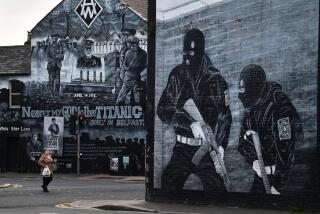A Start Toward Peace
- Share via
The agreement regarding consultation on the affairs of Northern Ireland, negotiated between the governments of Great Britain and Ireland, deserves the accolade of “historic.” In narrow legal terms it changes little. But in broad political terms it invites the beginning of an important process of reconciliation.
Extremists among the Protestant majority and Catholic minority in the north, who have rejected the agreement and threatened an intensified campaign of terror, demonstrate above all the difficulty of the peace process. Their stubbornness, their fear of an open and free political process, their reliance on hate and violence are fruit of generations of injustice, misunderstandings, manipulations and cruelty that cannot be erased quickly or easily. What Garrett FitzGerald and Margaret Thatcher have done, however, is to declare that Ulster is not and will not be Beirut, and that the civility and traditions of both great communities can prevail in a new harmony freed from the terror of fanatics.
The Irish majority will remain committed to the reunification of their land, and that may someday be accomplished. In the meantime the governments on both sides of the Irish border will respect the principle of self-determination. There is no question that the majority in the north is, at this time, committed to union with Britain.
An Intergovernmental Conference will be the instrument of reconciliation, providing the government of Ireland an advisory role in the future of Northern Ireland. There is no better instrument at this time to reassure the Catholic minority in the north and Irish nationalists on both sides of the frontier that a full and fair consideration will be given to Irish views.
The communique issued after the meeting between Thatcher and FitzGerald appropriately set security matters at the top of the agenda for the work of the conference. Until those small bands of vicious killers are isolated and disarmed, the peace effort will be handicapped, slowed and diverted. It is encouraging, however, that part of the initial communique addresses an element of the security program that has made matters worse--the intrusion of the British army where a civil police force would be preferable, if, as the communique states, the constabulary and Armed Forces in Northern Ireland can operate evenhandedly and with respect for both unionists and nationalists.
In 16 years the terror has claimed 2,500 lives. There is no better argument than that to get on quickly with the parliamentary ratification that will set this new process in motion.
More to Read
Sign up for Essential California
The most important California stories and recommendations in your inbox every morning.
You may occasionally receive promotional content from the Los Angeles Times.













